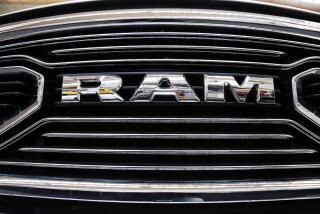Toyota to pay record fines for disclosure delay
- Share via
Toyota Motor Corp. agreed to pay two fines totaling more than $32.4 million for failing to promptly inform regulators of defects in its vehicles, instead allowing millions of potentially dangerous vehicles to remain on the nation’s roads.
The record penalties, resulting from months-long investigations by the Transportation Department into the automaker’s handling of safety issues, were related to floor mats that could entrap accelerator pedals and for a flaw that can cause total loss of steering control.
They come in addition to a $16.4-million fine levied against Toyota in April for delaying a recall of gas pedals that could become stuck, bringing the Japanese company’s total penalties to nearly $50 million this year.
Prior to this year, the largest penalty against a car company was $1 million, paid by General Motors in 2004 for delaying a windshield wiper recall.
The fines, announced by the government late Monday, were the latest blow to a company that was long heralded as the worldwide leader in safety and quality.
A Los Angeles Times investigation into sudden-acceleration complaints by owners of Toyotas led to three congressional probes and drew national attention to the issue. In the face of the mounting crisis, Toyota temporarily halted sales of eight models, issued millions of recall notices and made a rare public apology for its safety and quality lapses.
Subsequently, the National Highway Traffic Safety Administration opened its own inquiries.
“I am pleased that Toyota agreed to pay the maximum possible penalty,” Transportation Secretary Ray LaHood said, signaling that he would continue to take a tough stance with the automaker, which remains under investigation by the agency.
“I expect Toyota to work cooperatively in the future to ensure consumers’ safety,” he added.
Toyota’s board of directors in Japan voted to voluntarily pay the fine, prompting the Transportation Department’s announcement. Earlier this year, congressional investigators asserted that key safety decisions were made only in Japan.
In acknowledging the fines, Toyota’s top U.S. safety official, Steve St. Angelo, called the safety problems “legacy issues” ascribed to the company’s past. He said the company’s “North American operations now have a greater voice in making safety decisions, and we are taking appropriate action whenever any issues emerge.”
The company said that, in agreeing to pay the fines, it did not admit to any violation of safety laws.
While the government’s first big fine against Toyota set a record, the agency’s willingness to issue a string of three maximum fines goes far beyond any action it has taken against the auto industry for violations of safety laws.
“This fine signals that the agency is going to use the maximum authority it has to go after these companies,” said Joan Claybrook, former head of the National Highway Traffic Safety Administration. “But even a $32-million fine for a company like Toyota is meager, a pittance.”
Toyota remains the world’s largest automaker. Last month, the company said it earned $1.2 billion in its second fiscal quarter, a nearly fivefold increase from a year earlier.
Claybrook has been a leading advocate for federal legislation that would increase the maximum fine to $200 million, as well as impose a number of other new safety standards. That legislation, introduced after the Toyota hearings in February and March, has stalled.
The floor mat probe, begun in February, found that Toyota had failed to disclose the defect within five days of discovering it, as is required by law. Toyota had recalled 55,000 vehicles in 2007 for floor mat entrapment, but addressed the problem primarily with a change in labeling.
Two years later, after a high-profile crash of a Lexus in San Diego that took four lives, Toyota recalled more than 4 million vehicles for the same problem, this time announcing it would modify the mats as well as the design of the foot wells and pedals in those cars.
The government fined Toyota $16.375 million in that matter.
The other investigation, initiated in May, involved a one-year delay in notifying regulators about a steering problem. In 2004, Toyota identified a faulty steering relay rod that could suddenly break, causing total loss of control.
A recall was issued in Japan, but the company told U.S. regulators that no such action was necessary here because the problem was isolated to that country. But in 2005, Toyota reversed that decision and announcing a recall of nearly 1 million vehicles, including the popular 4Runner sport utility vehicle.
The fine in that case was for $16.05 million.
The Transportation Department is still investigating one other case that could result in a fine. That involves whether the automaker’s recalls for sudden acceleration included all the models that could be at risk.
Separately, the NHTSA is conducting an investigation with the National Aeronautics and Space Administration into the causes of sudden acceleration in Toyota vehicles, and the National Academy of Sciences is examining the phenomenon more broadly. Both those studies are expected to conclude next year.
The steering rod inquiry was opened after John Kristensen, an attorney at San Mateo firm O’Reilly Collins, filed a petition with the NHTSA in May.
He represents several plaintiffs who lost family members in accidents they blame on steering rod failure. He said he noticed the discrepancy in the timing of the U.S. and Japan recalls while researching the case.
“It was self-evident that Toyota was doing a recall in Japan but not in the U.S.,” said Kristensen, who said he had not been aware of the progress of the government’s investigation. “We’re pleased to hear this news.”







